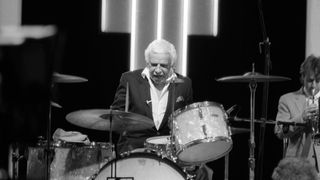With his stunningly talented big band, Pete Cater has done more than most in recent years to help keep the music of Buddy Rich out there. Here, the year that Buddy would have reached his century, Cater tells us all about his unrivalled influence.
What was your first experience of Buddy's music? What made it stand out to you?
"In 1968 when I was five years old my dad bought a Bang & Olufsen hi-fi system in order to play the newly acquired recently released Buddy Rich Big Band stereo LPs.
"The speakers stood about as tall as I did at the time and up to that point I had never heard music reproduced with such power and clarity. The impact was profound to say the least, and whilst Buddy was by no means the first big name jazz drummer I had become aware of (even at this early age I could name and recognise a number of prominent players including Joe Morello, Cozy Cole and Shelley Manne) his role in my early development as a player would turn out to be pivotal.
"My Dad would play these records often and would acquire the new releases over subsequent years up until the Roar of 74 LP came out, and that was the first one I bought for myself.
"The real epiphany came a year or so later when I actually saw Buddy play on television.
"Whilst I had been listening to jazz drumming since my earliest days Buddy was the first player I had the opportunity to watch and after the show was over I ran upstairs to my Dad's practice kit and started a lifelong quest for attainment.
"Observing my enthusiasm my mum commented to my Dad later that day, "That's it, he's going to be a drummer", with more resignation than enthusiasm if I'm completely honest."
How much of an influence has Buddy had on your own playing?
"I play drums because of my dad, and Joe Morello was the first big influence by some distance, but is Buddy Rich and Buddy Rich alone to whom I owe my lifelong affinity with big band music and big band drumming.
"He was that extraordinary rarity that I describe as the 'everyman virtuoso' in that his remarkable gifts as a player were completely apparent and could be understood and appreciated by anyone.
"A knowledge of jazz or dumming techniques was not a prerequisite to understand that you were witnessing greatness. His consummate musicianship spoke to everybody, and that's an achievement that whilst not unique puts him in a very special category.
"Perhaps more than any other single player it was Buddy who epitomised attainment at the highest level and inspired me to dig deep and strive to achieve. I spent a lot of my teenage years trying to come up with stuff that sounded like that kind of things I had heard him play, as distinct from merely copying or transcribing and his influence loomed large in my early years as a big band drummer.
"There are a couple of things of me on YouTube that bear this out, even down to the drum lay out. The formative influences are the most profound and they stay with you for the long haul."
His consummate musicianship spoke to everybody, and that's an achievement that whilst not unique puts him in a very special category
And how about his influence on the big band genre as a whole?
"In the heyday of big bands in the 30s and 40s Buddy was without doubt one of the biggest names in drumming, second only to Gene Krupa. His playing in those early days owes much to Krupa, Jo Jones, Chick Webb and many more, and what he did at this time was to take the best bits of all the other players and consolidate them into his own explosive style.
"For me the real innovation in his playing came much later and his big band recordings from 1966 onwards owe relatively little to the swing era Buddy Rich; the approach is fresh, modern, and very much reflects the changes in music that were happening at the time.
"As the sixties drew to a close he evolved a swaggering and individual approach to groove playing which was completely his own, and stands the test of time a great deal better than a lot of things that were wrongly considered hipper and cooler back then. If and when the definitive history of big band drumming gets written Buddy will be first on the list.
"Mel Lewis could very well be second and any aspiring big band players reading this could do a whole lot worse than to seek to occupy a notional middle ground between their two contrasting styles; it's an approach that has stood me in good stead for a while now."
What is it about Buddy that stands him out even 30 years on from his passing?
"I think it's important to remember just how far we have come in the last half a century. The average drummer of 2017 is way more clued up and savvy in all sorts of ways than his 1967 counterpart. With the huge proliferation of knowledge and information we all know a great deal more; mysteries have been unravelled, myths busted and general playing standards elevated to unprecedented levels.
"And yet Buddy Rich still sounds amazing, in a place by himself. I would give anything to travel back in time to watch the reaction of the drummers in the audiences of those first UK shows in March and April of '67.
"Nobody ever swung harder and as a soloist he is unsurpassed, combining facility, spontaneity, fire and a musical quick wit in an unmistakable style."


